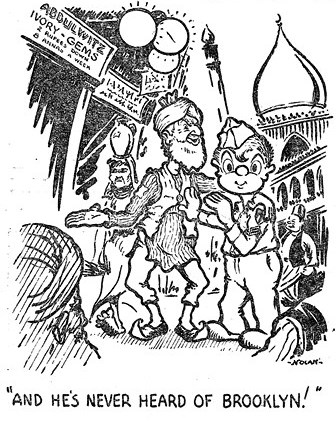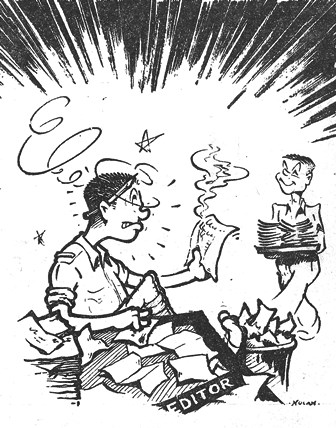
VOL. I NO. 40 REG NO. L5015 DELHI, THURSDAY JUNE 17, 1943.
JAP VS. JAP UP IN ASSAM
 OZAKI LOYAL AMERICAN
OZAKI LOYAL AMERICAN
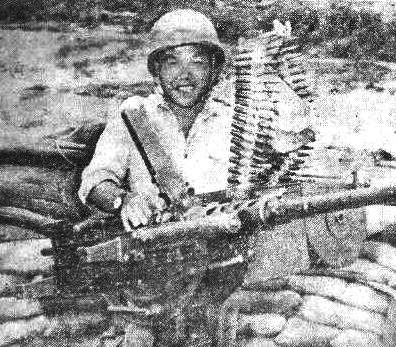
|
NORTH INDIA FIGHTER BASE - If enemy pilots attacking this base ever have the guts to swoop in low on a strafing mission, it'll be Jap against Jap from now on out.
On this end - on the firing line - will be chunky, fuzzy-haired Sgt. William K. Ozaki, 27-year-old Japanese -American from Eaugallie, Fla., who's "anxious as the dickens to take a crack at those Japanese planes."
Ozaki, the only "Nisei" in the C.B.I. Theater, is platoon commander on the Coast Artillery in charge of four 50-caliber ack-ack machine gun squads defending an American fighter airfield here.
There are half a dozen Chinese-Americans in the United States Army out here, so you get used to bumping into them. But you get quite a start when you first meet Ozaki. I've lived in the Orient for several years and think I usually can distinguish the people apart. So when I first saw Ozaki in the fighter control room where he was on detached service I walked up to him and said impertintly, "Good God, you sure do look like a Japanese."
He grinned bashfully, "Sure," he said, "but I'm an American."
Ozaki's a competent man with his guns. His commanding officer, Capt. Oswald Stewart, told me, "He's a damned good soldier and a cracker-jack leader of his men.
"When we were 'alerted' for foreign duty, I figured we might be coming out this way and asked him if he was sure he wanted to come along. There's plenty of danger of his getting shot out here - a case of mistaken identity, you know. Hell, nothing could hold him back."
Coincidentally, Ozaki and his men sailed on Dec. 7, 1942. They arrived here just in time for a Jap raid, but the Japs didn't come in low enough to take a crack at them.
Ozaki figures to sooner American planes start pouring bombs on Japan the better. "They've been bombing us," he said, "so I don't see why we shouldn't give it to them in return. I'd sure like to go along on a Japan bombing trip sometime."
His parents came to America years ago and his father still is living in Eaugallie. Young Ozaki speaks Japanese but cannot read or write it. He played high school football at Eaugallie, then drove a diesel truck for a Japanese lettuce shipper in Los Angeles.
Later, he chipped in with a couple of "Nisei" pals and bought a farm at Woodbine, Ga., where they were "doing okay" until, seeing the draft on its way to snag him, he enlisted in May, 1941. His cousin, Fred Ozaki, also of Eaugallie, is an air force staff sergeant someplace overseas.
Ozaki hasn't picked out a wife yet, but said he had several prospects on the string. He got a package of candy, cigarettes and brush and comb recently from Miss Irene Magasugi, 20-year-old Blanca, Colo., telephone operator, whom he admires.
"But I hope that doesn't get into the Georgia papers," he said blushingly. "I've got a couple of more gals there."
|

|
Top Turret Gunner
Shoots Down Japs
In Billy the Kid Style
By S/SGT. ROBERT E. BADGER
CHINA AIR BASE - The Japs probably learned long ago that the boys from America's southwest are bad medicine when it comes to gunplay, particularly those of the 14th Air Force.
They received a convincing lesson in the fine art of shooting a la Billy the Kid recently when 31-year-old S/Sgt. Arthur J. Benko, of Bisbee, Ariz., got into action.
Top turret gunner of a heavy bomber attacked by a flight of Zeros over China, Benko shot down four Jap planes confirmed and three probables.
As a result of his accurate and heavy fire, the remaining Zeros fled.
P.S. - He has been recommended for the Air Medal.
T/Sgt. Israel Blumenfield is another multiple Jap killer. A waist gunner, he knocked down three Zeros in one operation.
14th Air Force Wallops Japs In China Raids
|
CONGRATS 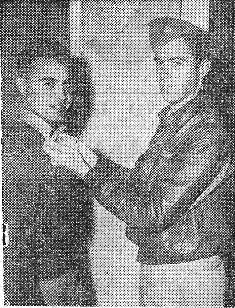
|
Latest reports from Maj. Gen. Claire L. Chennault's headquarters describe how B-25's escorted by P-40's bombed the Nachang airfield scoring direct hits on two large hangars and inflicting extensive damage on other hangars, runways, dispersal areas and the control tower. The bombing was made without enemy interception or AA fire.
Two P-40's on an offensive reconnaissance in the Canton area were jumped by eight Zeros. One of the enemy was shot down, and three more were listed as probables after the scrap.
THRUST DEFELCTED
On another day, P-40's dive-bombed the railroad bridge and ware house area at Pachi, while eight enemy troop barges escorted by two boats were strafed near Shagi and a single intercepting plane destroyed.
An enemy thrust by bombers and fighters at a 14th Air Force base in Hunan province was intercepted and the Jap deflected from the target. Score: One bomber and one bomber probable; three fighters probable.
Earlier, medium bombers of the 14th Air Force attacked with success coaling docks, warehouses, railroad yards and power transmission lines. There was no enemy interception.
On all these missions, our planes returned safely.
GUERRILLAS STRIKE
Chinese guerrillas in coolie dress made deadly raids recently within Ichang and dynamited two staff headquarters. On the same day, Chinese regulars cleared the bank of the Yangtse opposite Itu.
Chinese troops entered Kinhwa, last Jap air base in the province of Chihkiang, only 650 miles from Japan.
The Chinese are still pursuing Japanese troops which evacuated Sungtse and report having inflicted heavy casualties.
|
|
Increase In Theatre
"On the evening of June 5, a fire broke out in the upper structure of an out-of-the-way outhouse. Fast thinking led to a quickly-assembled fire brigade, with all available pans and buckets set to the task of hauling pani. Although a splendid job of fire fighting
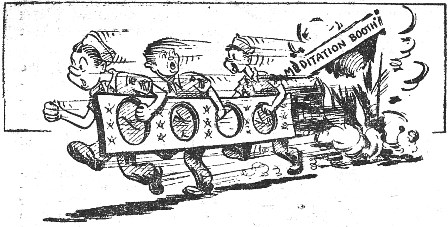
|
"Gallantry in action medals are in order for M/Sgts. David E. Grimm and Willie L. McGee and Pfc. Jake (Snake) Tomlinson, who, disregarding their own personal safety and with commendable courage, rushed into the flaming inferno just in the nick of time to haul out of the thick, pale smoke that beautiful piece of furniture - a four-seater job.
"The edifice was only recently completed. It was planned with loving care by the Supply Department and built by local Indian carpenters. We were proud of its muslin-screened windows and whitewashed burlap walls and ceiling. The four-seater that was rescued so heroically from the fire was made to order in town from the local furniturewalla. It was his deluxe model.
"Now the boys are facing the monsoon. They'll have to do their reading out in the open during inclement weather and during the torrid spells that precede and follow it. It's a grim war."
| The WACS, the WAVES, the SPARS - they're the glamor gals of this war. You read comparatively little about the ANC (Army Nurse Corps). It serves in silence. But wherever there are U.S. troops, no matter how tough the going the ANC is there, Jenny-on-the-spot, to administer to the wounded and sick quietly, capably and often under trying circumstances. The pictures on this page were taken of a unit "somewhere in Assam," a carbon copy of several in the Theater. (Photos by T/4 Martin Leyland, Roundup staff photographer). |
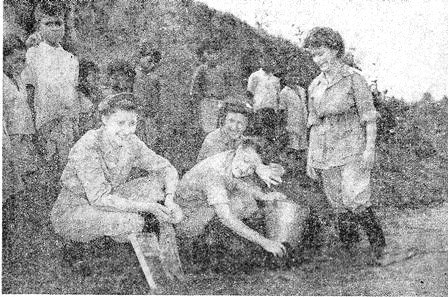 A combination of heat, dust and rain makes daily laundering a tedious chore.
Pauline Moore uses her washboard to advantage.
A combination of heat, dust and rain makes daily laundering a tedious chore.
Pauline Moore uses her washboard to advantage.
|
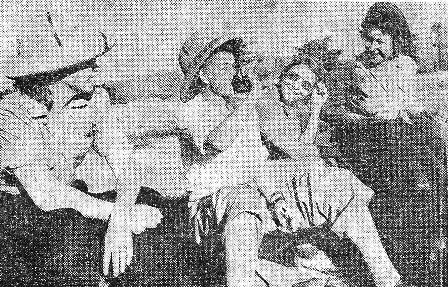 Members of the ANC root at a ball game.
Left to right, Barbara Davis, Irma Lindberg, Irma Reinhoitsen and Anna Suchma.
Members of the ANC root at a ball game.
Left to right, Barbara Davis, Irma Lindberg, Irma Reinhoitsen and Anna Suchma.
|
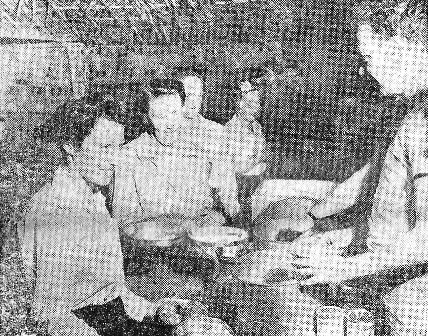 Lined up in the chow line are Eleanor Potter, Mildred Pierc, Gwendolyn Wentworth and Alice Goddell.
Lined up in the chow line are Eleanor Potter, Mildred Pierc, Gwendolyn Wentworth and Alice Goddell.
|
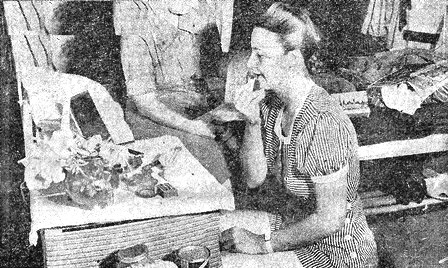 Sara Jane Houtz pretties herself in preparation for a date after the day's work, while her roomie, Jane E. Holstein peruses a book.
Sara Jane Houtz pretties herself in preparation for a date after the day's work, while her roomie, Jane E. Holstein peruses a book.
|
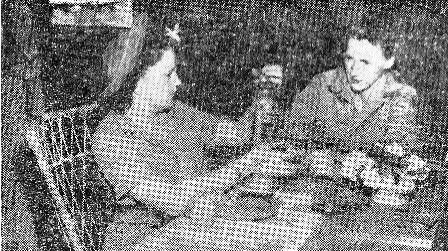 When things need to be fixed in their quarters, the nurses don't ask for help. Meet Dorothy Lamberty and Florence Brunner.
When things need to be fixed in their quarters, the nurses don't ask for help. Meet Dorothy Lamberty and Florence Brunner.
|
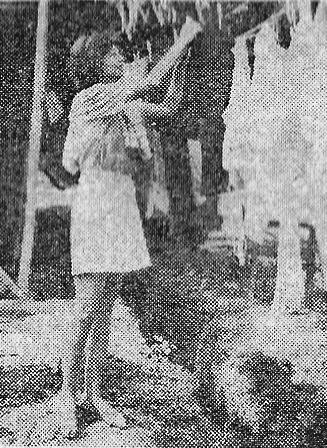 Gertrude Clark takes down her wash, which has dried quickly.
Gertrude Clark takes down her wash, which has dried quickly.
|
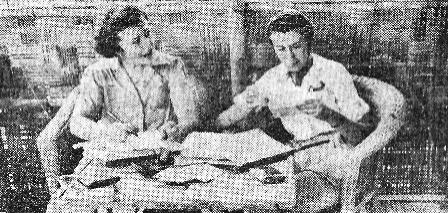 Much off-duty time is spent in homey pastimes like reading and letter-writing, as Dorothy Harris and Helen Kiley.
Much off-duty time is spent in homey pastimes like reading and letter-writing, as Dorothy Harris and Helen Kiley.
|
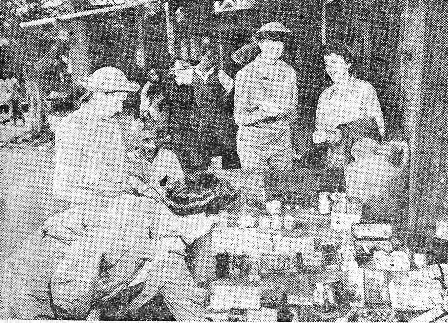 The nurses launch a shopping tour at a nearby village. Left to right, Neila Burd, Elizabeth Silkey, Edythe Husum and Agnes Spies.
The nurses launch a shopping tour at a nearby village. Left to right, Neila Burd, Elizabeth Silkey, Edythe Husum and Agnes Spies.
|
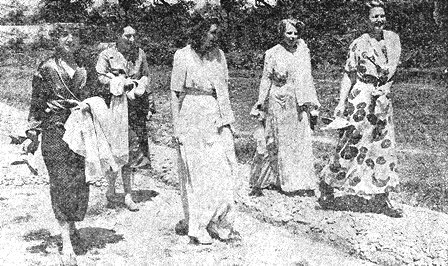 On their way to the shower room, left to right, are Agnes Kauker, Ruth Peterson, Sara Jane Houtz, Jane Holstein and Marion Hadfield.
On their way to the shower room, left to right, are Agnes Kauker, Ruth Peterson, Sara Jane Houtz, Jane Holstein and Marion Hadfield.
|
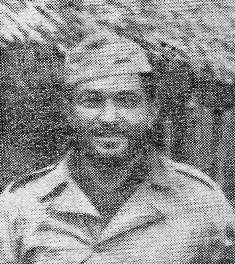
|
Long-Forgotten Salute Returns
To Fashion At New Air Base
By Cpl. LEE KRUSKA
EAST INDIA AIR BASE - When the fighting men of this organization arrived recently at their new base, they ran smack into a little, barefooted Ghurka guard who kept reminding them there was such a thing as a salute in the Air Corps. Wherever they went, whatever they did, they were certain to bump into the proud little soldier, who got around with unbelievable alacrity. It was always the same: Meeting officer or G.I., he would snap to attention and raise his arm in a precise, smart salute. The great ceremony he attached to the action plus the fact that G.I.'s aren't used to being saluted first resulted, as you might have guessed, in most of the salutes being returned rather sheepishly. On a few occasions when his presence was ignored, the little Ghurka hung around at attention for great lengths of time, waiting for an opportunity to whip one across. But, when a salute went unnoticed, a look that plainly spelled "I've been insulted" or "You're no soldier" spread over his intent Indian face.
It's Maj. Robert D. McCarten now. The likeable, good-looking pilot, who took over command of the Skull and Wings bomb squadron a few weeks ago, was recently notified of the promotion hiking him a grade. But habit is strong however, for when signing for the telegram which brought the welcome news, he unconsciously or otherwise jotted down "captain" before his name.
POPULATION BOOSTED
Add one more to the population of Maquoketa, Ia. She's Judith Ann Henton, whose father, Cpl. Glen (Red) Henton, was notified of her birth in his latest letter. Henton, horseshoe tosser par-excellence, sweated out her arrival more than he ever did a ringer in toughest competition.
"Ouch, my head!" or "*$! at* & these roofs" and other similarly ventful expression have been heard on all sides since the squadron moved into the stoop-as-you-enter monsoon barracks. Never has there been such a crop of head bumps as currently, all of which proves that being an Odishio, Zeidler, Tischendorf or a Lewis has its advantages. These so-called little guys suffer for lack of reach in the mess hall and lack of height at the movies, but shortness of stature has its compensations.
Did you ever hear that Pvt. Arthur Israel once almost had a letter returned to him because he used too many "two-bit" words? The censor thought he was writing in code.
FIENDISH FATHER
"It shouldn't happen to a dog," moans Pfc. Ed Kukar, the roly-poly Minnesota iron range bartender. As id being in India isn't bad enough, Ed's dad, a tavern owner, recently sent him some snaps of life back home in wartime and all but one dealt with Kukar Sr. and friends in various and sundry beer-guzzling poses. Anyone who has ever witnessed Big Ed put away the brew can appreciate the acute discomfort caused by such pictures . .
Temporarily called Thazi Junction, a bigger and better non-coms' mess has been opened at this base. Presiding behind the bar are T/Sgt. Bob Kramer and Pfc. George Kenny, the former dealing out with his usual geniality and the latter with sharp quips and witticisms. Kenny was overheard telling a customer the other nite that "my prickly heat rash feels so good when I scratch it that I'm almost glad I've got it."
|
Hump Jumpers En Route Home After CNAC Job Associated Press War Correspondent CALCUTTA - Two American fliers of fortune, Capts. Joseph Genovese, 32, of San Diego and Aleck J. Gingiss, 28, of Chicago, are United States-bound after completing 800 hours apiece of the world's most dangerous flying, over the hump of the mighty Himalayas, some of whose peaks extend upwards to 29,000 feet. During the past year, these veteran pilots shuttled thousands of tons of vital war material to China from India. They flew for the China National Airways Corp. in fair weather and in foul, but mostly foul. They are called "boys who fly when birds don't." Genovese and Gingiss came to India last year from England, where they delivered all types of aircraft to the RAF via the Atlantic. FLEW 76 TYPES "We've flown everything from Piper Cubs to Liberators - 76 types in all," Genovese said. He and Gingiss plan to accept test pilot offers when they return to the States. Genovese and Gingiss had more hair-raising experiences than Flash Gordon. Once Gingiss, six-foot, 195 pounder, got into icing conditions. The windshield was covered with ice and Gingiss opened it to see where he was. Staring him in the face was a huge jagged peak. He swung the wheel and barely missed the peak, and landed two and a half hours overdue with only 20 minutes gasoline left. Genovese, five-foot-eight, 153 pounder, had a narrow squeeze when the oxygen ran out when he was at 24,000 feet. Thirty-two passengers, all crewmen except Genovese, passed out. He almost hit a 17,000-foot peak, but managed somehow to get to his destination. PILOT WENT DAFFY Another time Genovese's Chinese co-pilot went daffy when the oxygen line froze, grabbed the controls and nearly flew the plane into the mountain. Genovese swung a Joe Louis haymaker and knocked out the co-pilot, who later said he didn't remember the incident. Genovese and Gingiss made between $1,500 and $2,000 apiece monthly flying the hump but said, "Enough's enough." Genovese, who has been flying for 12 years, said "Test piloting probably will seem like a snap compared with hump hopping." |
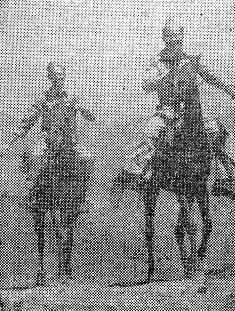
|
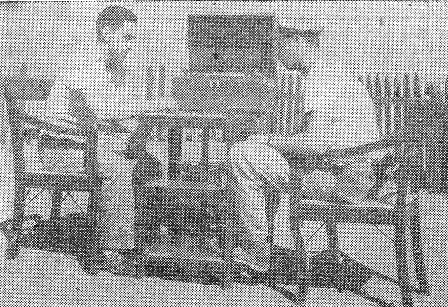
|
HECTIC CHOO-CHOO RIDE
 BRUSH WITH THE LAW
BRUSH WITH THE LAW
By SGT. JACK BLUMENFIELD Special Roundup Correspondent
REST CAMP - "You show him, lieutenant," joked G.I.'s as Lt. I. F. Haxel, aided by S/Sgt. Bill Baker, outdid a professional Indian performer who had drawn an appreciative crowd on the station platform. Haxel's frenzied acrobatics in getting the khaki-clads off safely on the train surpassed even the wandering showman's matchstick tricks.
Such was the gay beginning of a trip which was to take the G.I.'s from their torrid Army stations on the Indian plains to a cool retreat "up in the hills." Up there, at a quiet rest camp, they were slated to spend a two weeks that would mean welcome respite from muggy humidity and daily routine.
Here was a fine holiday at the expense of the U.S. government - for most, their first furlough since joining the Army. The gang was in fine fettle for fun.
At one station, during a stop-over of 10 minutes, they encountered a fakir who had a dagger running into one temple and out of the other. The G.I.'s gaped in incredulity and, after some bilingual cross-questioning, were able to elicit the tall tale that the old fellow had started pushing the dagger through his right temple at an early age, but only recently had the point torn through the other temple. "The Skull," as the G.I.'s quickly named him, was well rewarded with baksheesh. He had shown much more originality than the acrobat-magician and the Yanks proved that they appreciated his genius.
The travelers went on a buying spree whenever the train halted at a junction. Cpl. Charles Lockavitch and Sgt. Russell Casteline bought a couple of long swords at a famous Sikh holy city. Later, these would-be swordsmen amused themselves with mock-duels. S/Sgt. Thomas Harden ransacked one town for beer and, after acquiring what looked like the city's entire supply, almost missed the train because of his burden.
All along the route, the station vendors did a land-office business - the heat-soaked G.I.'s bought up all the tea, coffee, soda-pop, beer and fruits which the wallahs could produce.
For two nights the vacationers slept on the makeshift Pullman. Beds, in double tiers of three, were wooden-slatted park benches which measured no more than two-hand spans in width. Each G.I. for the cold night ahead, had to make the decision as to whether he wanted to cover himself and be warm, or use his blankets as a mattress and wake up unmarked and in one piece.
In due time, the train finished its run and the men piled out. Soon they met the group which had just finished a two weeks stay. There was Capt. Charles Holmes being mobbed by a crowd which was interested in learning all about his little jaunt from the rest camp to a spot known as India's most beautiful mountain resort. And Cpl. Elmer Johnson, heavily bearded, who had taken a similar trip, was also surrounded by inquisitive G.I.'s. A funny experience was meeting little T/Sgt. Billy De Rosa, limping around on a cane because of blisters on his feet, and listening to him exclaim vehemently that he would rather walk to town from camp and get footsore, than ride horseback and develop blisters on the nether region as did others he knew.
These stories whipped up the interest of the G.I.'s who were headed for the recuperation camp, and when the buses arrived which were to take them to the top of the mountain, the soldiers crammed in like sardines, some even sitting on the roofs with the baggage.
This led to complications further down the road for the local constabulary stopped the queue of buses and issued a wad of traffic tickets because of overcrowding. The caravan had been halted for an hour before Col. J. E. Fitz-Gibbon arrived to right things and send the men on their way.
As the buses climbed steadily skyward, the roads grew progressively worse and the barriers along the roadside flimsier. This, plus the facts that the vehicles were rickety and the drivers seemingly unskilled locals, caused may a G.I.'s heart to leap into his throat as the road wound over the edges of the precipitous cliffs, around the face of the mountain. The vehicles chugged along, stopping periodically, however, to cool off motors which erupted like miniature volcanoes. Each time the driver would pour water down the radiators. On the other side of the road there would invariably be other drivers who were watering their brakes, which had been over-heated by the downhill ride.
Four hairpin curves, which in each case required the buses to back up to make the turn, were enough to prove to the G.I.'s that the drivers were excellent and knew their roads. After seven hours of crawling over the 34-mile route which wound up to an altitude of about 7,000 feet, the G.I.'s were very much relieved when they arrived at camp without incident.
|
STATION HOSPITAL CELEBRATES YEAR OF OVERSEAS DUTY EASTERN INDIA - The (blank) Station Hospital celebrated its first year of overseas service here recently with a cocktail party and an outdoor dinner. The unit, commanded by Maj. C. B. Warrenburg, has been on the move within India since disembarking from the Santa Paula. It has operated three different hospitals, one of which it built from the ground up. A committee consisting of T/3 Long, T/4 Taff and T/5 Newman whipped up a rip-snorting anniversary affair in which everyone had a grand time. Frank Moore's emceeing drew plaudits and he warbled a couple of ditties, too. The enlisted men's quartette and the nurses' trio also gave their vocal "all." - By T/4 GEORGE W. NEWMAN. |
Several weeks ago, Maj. Fred L. Eldridge, the poor man's William Randolph Hearst, bustled from the "front office" into the editorial sector of the Roundup and tossed a learned tome upon the editor's desk. It's a "must go," he ordered. So the Roundup published the major's story on preventive malaria measures. His research had been painstaking and the article was a masterpiece of its kind. Today Eldridge is flat on his back at the hospital. You've guessed it, his ailment is . . MALARIA. |
|
NEGROES PLEDGE FULL ASSISTANCE IN WINNING WAR NEW YORK - Twenty thousand Negroes, participating in a rally at Madison Square Garden, pledged the co-operation of the American Negro to the achievement of the unconditional surrender of the enemy. "As loyal Americans, we pledge our lives, fortunes and energies in full support of the Commander-in-Chief for the unconditional surrender of Hitler and those who are aiding him." The rally adopted a program of work "for postwar world freedom and equality for all peoples, irrespective of race, creed or color." Wendell Wilkie telegraphed to the meeting saying that the speed with which victory is to be achieved may be measured by the unity and selflessness of all Americans. |
 HERE’S THE REASON
HERE’S THE REASON
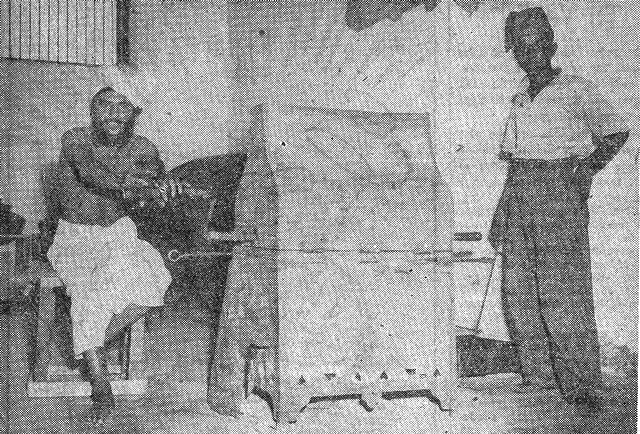 If you G.I.'s stationed in India enjoy your coffee, thank this grinder and the two Indians who operate it.
The machine is at a western port base. (Photo by T/S Walter J. Tanner).
If you G.I.'s stationed in India enjoy your coffee, thank this grinder and the two Indians who operate it.
The machine is at a western port base. (Photo by T/S Walter J. Tanner).
|
10th A.F. Pounds Japs
Hampered by monsoon weather, the 10th Air Force bombing tempo was slowed, but B-25's reported successful attacks upon the enemy in Burma during the period June 11-14. The thumbnail sketch:
JUNE 11 - B-25's struck at Thazi Junction and Ywataung; B-24's dropped three tons on bombs on radio installations on Diamond Island; and P-40's, armed with fragmentation bombs, accomplished several offensive missions in the Hukawng Valley area of northern Burma.
JUNE 12 - It was a good day for B-25's, which successfully pounded the railroad bridge at Myitnge, dropped 10 tons of bombs on railway installations at Mandalay and Sagaing and sank two, possibly three, boats used to ferry freight across the Irrawaddy River.
JUNE 13 - Bridges at Meza and Katha were B-25 targets, while other mediums reported direct hits on installations at Nyaungbinwun and rolling stock at Allagappa.
JUNE 14 - B-25's reported hits on the approach and near misses on both sides of the spans at the railroad bridge over the Mu River, west of Legyi. A second formation of mediums destroyed buildings in the Maymyo railroad shops.
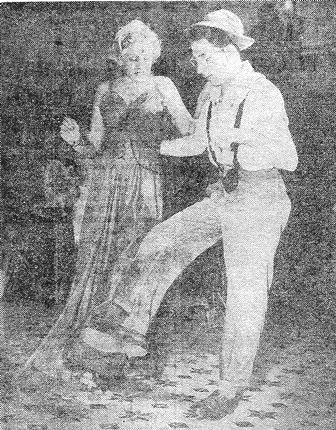 Sgt. F. Arthur Garlick, of a West India port, captioned this picture: "Cy and his step out."
"Cy" is Cpl. Jesse Leachman, of a dental section.
Sgt. F. Arthur Garlick, of a West India port, captioned this picture: "Cy and his step out."
"Cy" is Cpl. Jesse Leachman, of a dental section.
|
|
BY AIR FORCES |
Award of D.F.C.'s, Silver Stars, Purple Hearts and Air Medals totaling 229 were recently announced by the 10th and 14th Air Forces.
Many famous names in the 14th Air Force popped up on the list, including those of Col. Bruce Holloway, Lt. Col. John Alison, Maj. Edmund Goss, Maj. Grant Mahoney, Capt. John Hampshire and Lt. Charles Dubois.
To Alison went the D.F.C. and the Silver Star. The D.F.C. citation listed five enemy planes shot down and over 50 combat missions. He was awarded the Silver Star for personally leading an attack upon bombers raiding an airfield in China in which 10 Jap planes were knocked down.
Hampshire, leading ace in the Theater until his tragic death, was posthumously awarded the D.F.C.
The Silver Star was conferred upon Mahoney for 75 combat missions.
Holloway, in earning the Air Medal, was lauded for 50 missions and six Japs knocked down up to April 26.
D.F.C. citations for Goss and Dubois told of five Jap planes destroyed by each.
14TH AIR FORCE
PURPLE HEART - Lts. Eugene H. Wanner, Walter A. Smith, Kermit C. Hynds, Donald S. Broodfield; T/Sgts. George E. Maage, Rex L. Murphy; S/Sgts. Paul L. Hoge, Thomas J. Fisher, Richard C. Lee, Joe J. Renoso.
SILVER STAR - Lt. Col. John R. Alison, Lt. Byron H. Gilmore, S/Sgt. Bernard J. Melman.
AIR MEDAL - Col. Bruce K. Holloway, Maj. Grant Mahoney, Capts. Hollis M. Blackstone, Robert Costello, Robert F. Mayer, William E. Miller, Joseph L. Skeldon, Douglas C. Weaver, Elmer W. Richardson; Lts. Samuel D. Berman, Thomas J. Clark. William B. Hawkins, Romney W. Masters, Clavin C. Moody, Teddy R. Shapou, Clyde C. Vaughn, James M. Williams, Charles H. Dearth, Charles D. Jantzen, William N. Ross, Winthrop P. Sears, Stewart E. Sewell, Donald S. Brookfield, Edward H. Calvert, Mathew M. Gordon, Jr., Malcolm F. Groseclose, William Grosvenor, Jr., Jermit C. Hynds, John H. Keene, James W. Little, James L. Lee, Raymond A. Mitchell, Robert L. Tempest, Charles Tucker, Vincent J. Scally; T/Sgts. James D. Burge, Charles H. Patton, Earl D. Rhodes; S/Sgts. Carl W. Bankston, James W. Broughton, Jean P. Yates.
DISTINGUISHED FLYING CROSS - Lt. Col. John R Alison, Maj. Edmund R. Goss, Capts Dallas A. Clinger, Arthur W. Cruikshank, Jr., John F. Hampshire, Clyde B. Slocomb, Jr., Robert E. Smith, Heath H. Wayne; Lts. Lauren R. Barnebey, George R. Barnes, Jack R. Best, Donald D. Bryant, Walter S. Butler, Charles H. Dubois, William Druwing, Chester D. Griffin, Melvin B. Kimball, Mack A. Mitchell.
10TH AIR FORCE
DISTINGUISHED FLYING CROSS - Capts. Raymond J. Disher, John Tyson; Lts. Robert S. Miller, Merle G. Bryan, Robert J. Clarke, Thomas L. Murphy, Chester R. Williams, Francis T. Bonsteel; T/Sgts. Norman J. Blazzard, Harry K. Gould, John D. Simos, William B. Stripling, Jr., Russell W. Seiss; S/Sgts. Joseph L. Carlstrom, Harry M. Chenoweth, Harold J. Everett, George G. Fraga, Tom Hendrix, Glen Henion, George S. Ingebo, Robert P. Latus, Don D. Meyers, Raymond B. Swartz.
AIR MEDAL - Col. John E. Barr, Maj. Dale L. Swartz, Capts. Edward M. Garrett, John Y. Christy, Robert S. Puckett; Lts. Edward L. Rathbun, Robert L. Martin, Warren S. Bollmeier, Russell S. Milsch, Philip O. Robertson, Edison C. Weatherly, Robert E. Dethlefsen, Thomas F. X. Cakert, Robert L. Plagens, Austin H. Russell, Jerome Reiss, John R. Amann, Robert H. Ruick, Leonidas V. Keck, Frank O. Redman, Melvin R. Lynn, Lloyd K. Jensen, Robert C. Bailey, James R. Barton, Robert G. Brittenback, William R. Coleman, Harold W. Goad, Julian I. Lebo, Terrell D. Shores, Harold K. Trinkle, James R. Alexander, Jr., Felix R. Bailey, Edwin R. Davies, William L. Deck, James F. Duffy, Albert J. English, Emil S. Gavlak, Charles W. Grotte, Louis T. Hagen, Thomas K. Hanney, Max R. Herrmann, Stanley J. Hood, Edward K. Hutchinson, Alan Kass, John C. Kelley, Emil A. Kremer, Harold V. Larkin, Joseph E. McCord, Jr., Edward L. McCoy, Walter V. McCoy, William B. McDonald, Robert L. McIntosh, Cecil W. Painter, Earl A. Rambow, James E. Rogers, William L. VanDyke, Arel Vanzandt, Arthur F. Warden, Leon H. Zimmerman, Jr., Wilbur O. Marcus, Chester N. Severin, Frank E. Dougherty, Patrick A. O'Donnell, Verlie U. Gree, Connor C. Griffin, Alex J. Porter; F/Os Robert E. Reimann, William C. Tyndall; M/Sgts. Richard P. Yenney, Elmer L. Hildreth, Fred A. Braemer, Robert C. Bourgeois; T/Sgts. William C. Tucker, Homer W. Alford, Omar A. Austin, Robert W. Baird, Lloyd M. Baxter, Eldred F. Christen, Russell F. Doman, William T. Hays, James Marshall, Royal E. Peterson, Theodore S. Smith, Maurice M. Friedman, Delmar C. Harland, John D. Butler, James Ruska, John W. Carter; S/Sgts. Lester V. Bebout, Edward M. Blaszczyk, Grant L. Butcher, Paul C. Ballenger, Jr., Arthur E. DeWitt, Hiram M. Cowen, Byron R. Seviert, Frank J. Lang, Henry J. Caldwell, John W. Calla, Robert A. Carrier, Frank J. Chiarello, Francis L. Diegman, Robert H. Dolph, Verl Frost, Robert V. Gamble, Thomas L. Grady, Rolland D. Guffin, Warren C. Hinds, William H. Huffnail, Emerson W. Hurd, Robert E. Hutton, Melvin R. London, Otto K. Manwarren, George H. Marshall, William L. Myers, Bajarne N. Nelson, Ernest M. Neil, Jerre Nibling, Chester L. Perigo, Ralph R. Perrone, Francis E. Sawyer, George P. Sibulski, Henry T. Spiek, Robert M. Stantorf, Warren W. Stubbs, Joseph B. Wells, Roy R. Whistle, Robert W. Witte; S/Sgts. Russell F. Price, Kenneth L. Stocker, Geil W. Traverse, Willard E. McDermott, Glenn R. Shipman, James B. Ridge, Earl P. Tiscrendort.
|
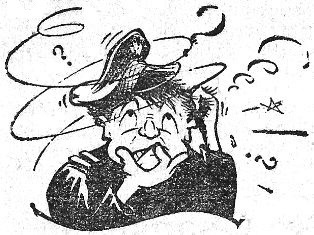 by Burmese nurses.
I shoot at targets in Burma cleared by Indians, guarded by Americans, with Chinese rations, in Indian baskets, packed by American soldiers and
lowered by British parachutes. I am AWOL from the unit with which I am on special duty, while the unit with which I am on special duty won't claim me.
My orders are issued V.O.C.O., yet I have to refer to written orders when keeping my records. My kitchen is inspected by my old Commanding Officer,
my meditation booth by my new CO and my bed by my CO-to-be. I am played to sleep at night by Indian toms toms and awakened in the morning by singing
Chinese. Finally, I am paid by Uncle Same in Indian rupees to buy Australian beer to drink with American girls to drown my troubles caused by the
Japs. Signed FIGHTING MAD (Capt. George T. Oakley).
by Burmese nurses.
I shoot at targets in Burma cleared by Indians, guarded by Americans, with Chinese rations, in Indian baskets, packed by American soldiers and
lowered by British parachutes. I am AWOL from the unit with which I am on special duty, while the unit with which I am on special duty won't claim me.
My orders are issued V.O.C.O., yet I have to refer to written orders when keeping my records. My kitchen is inspected by my old Commanding Officer,
my meditation booth by my new CO and my bed by my CO-to-be. I am played to sleep at night by Indian toms toms and awakened in the morning by singing
Chinese. Finally, I am paid by Uncle Same in Indian rupees to buy Australian beer to drink with American girls to drown my troubles caused by the
Japs. Signed FIGHTING MAD (Capt. George T. Oakley).
 HOSPITAL UNIT CELEBRATES
HOSPITAL UNIT CELEBRATES
 A General Hospital in Assam recently celebrated the first anniversary of its activation with a dinner and dance spaced over two joyous
evenings. Left, T/4 James T. White, mugging for the camera, misses the cup held by Capt. Harry A. Mesjian, as left to right, Capt. Edward
R. Gilda, Lt. Marie C. Brown, Capt. Vincent P. McNally, Capt. Paul O. Klingensmith and Robert H. Chain also watch the birdie.
Center, the solid sax section of a down-to-earth ace jive orchestra of a colored engineer unit "gives out."
Right, Capt. Mary E. Cornelius (third from left) accepts congratulations for her promotion from first lieutenant. She is head nurse.
Her well-wishers are Lt. Helen L. Pence, Lt. Col. I. S. Ravdin; Col. Elis F. Cooley, commanding officer of the hospital unit; and
Lt. Col. John Mitchell.
A General Hospital in Assam recently celebrated the first anniversary of its activation with a dinner and dance spaced over two joyous
evenings. Left, T/4 James T. White, mugging for the camera, misses the cup held by Capt. Harry A. Mesjian, as left to right, Capt. Edward
R. Gilda, Lt. Marie C. Brown, Capt. Vincent P. McNally, Capt. Paul O. Klingensmith and Robert H. Chain also watch the birdie.
Center, the solid sax section of a down-to-earth ace jive orchestra of a colored engineer unit "gives out."
Right, Capt. Mary E. Cornelius (third from left) accepts congratulations for her promotion from first lieutenant. She is head nurse.
Her well-wishers are Lt. Helen L. Pence, Lt. Col. I. S. Ravdin; Col. Elis F. Cooley, commanding officer of the hospital unit; and
Lt. Col. John Mitchell.
|

OVER THE HUMP Yes, I've read the news of Russian lines, How they battled through the cold, And I've talked to men from desert fronts. And I've heard the tales they've told. Oh, it's tough, I know, to fight in sand As you sweat from morn' till night. But I'll tell you now of men and planes And the way we have to fight. It's a different tale from fights back home, Where you wait till the skies are clear; But there's men who need the food we fly And they get it over here. As you climb your ship near snow-capped peaks That reach up toward the sky. You will pray to God that all goes well- It's the prayer of all who fly. Then the clouds grow black: They always do. And they blot out all your path As they grow from Hell and right on up. While they dispatch all their wrath. Soon you find a break and through you start With the black walls on each side. But you're soon closed in and left to guess As to all the peaks they hide. Then you concentrate to fly your course. Yes, that gyro's might nice. But you glance away and lucky you did For your loading up with ice. No, your chances then aren't worth a damn- But you smile, for this you know- You can stay right in that icy cloud And it's there the Japs won't go. As the time goes by and eyes are dim And the storm is in the past. Then the sun breaks through from God above Just to guide you home at last. Then we'll meet some day when lands are free and we'll tell our tales and then, We can settle back to reminisce And to fly the Hump again. - By F/O EMERY V. BARRUS. |
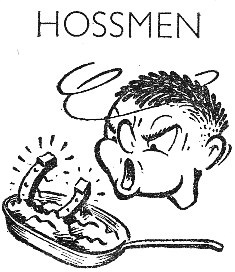
CHINA - Bing Crosby had better look to his laurels. Not as a singer, but as an owner of horses. M/Sgts. Bill Farinelli and Charles Stoopes and T/Sgt. Tom Stevens recently purchased three equines of ancient vintage from an enterprising and shrewd Chinese horse trader, paying $35.00 per nag. They are reported training them as opponents of Don Bingo. Upon the mysterious disappearance of Stevens' horse, local G.I.'s are now inspecting all "Beef" with a wary eye. There is a malicious rumor that a horseshow was found in a stew the other day. - By S/Sgt. ROBERT E. BADGER. |
No Chaplain, So Enlisted Men Volunteer Until His Arrival
ASSAM ENGINEER BATTALION - We've a very good colored Chaplain up this way now. But before his recent arrival, we didn't sit back and neglect church services. No, sir. Enlisted men from the companies volunteered their services as preachers, and there were many fine ones. Pvt. Burd Brown, of "C" company, was especially outstanding although other G.I.'s did fine work, too.
All the companies here have fine singers, and there are several exceptional quartets. Rivalry in the kitchens started when two companies baked a cake for the winning quartet and the cooks, in turn, vied to see who would bake the best cake for the prize.
We're doing one of the most important engineering jobs in India, although 50 percent of the equipment we are using was laughed at by a high-ranking English officer, who said he had never seen it used except as a toy in a training center. We have passed four phases of work on our assigned project, and each one was pursued with relentless vigor and pushed to the utmost.
Our handicaps have been many, including Assam's spring weather, leeches, and infinite variety of other insects, snakes and malaria. We have had our share of rain and the resulting mud, making dry clothes and shoes a rare treat.
LEAKY ROOFS
Yet we've never grumbled more than to put up the usual G.I. gripe about G.I. supplies. It is not uncommon to see shelter halves pitched over cots under tent roofs that are leaky as sieves.
There is considerable rivalry among the companies - each claiming to do the most and best work, but all are united in disclaiming the efforts of other units on the job. No matter how severely it has rained, we haven't slowed up. Satisfactory work was done by working at night. We deserve more than a small measure of credit for that.
HAVE REC HALLS
Each of the companies has a Rec Hall supplied with furniture, cards, Victrolas, late recordings and magazines, supplemented by homemade materials. The day rooms are used for letter writing, card playing and church services.
Movies have been a great morale factor. Attendance has been over 75 percent. However there have been no "flicks" for over a month now, and we're looking forward keenly to our next.
Our daily news bulletin is our pride and joy. The editors of the Hairy Ears Herald are doing a fine job and deserve a pat on the back. BY ANONYMOUS.
Barr Presented Three Medals; States-Bound
Col. John E. Barr is gone, but far from forgotten.
He has left the C.B.I. Theater for reassignment in the United States, but before he departed he stopped long enough at 10th Air Force Headquarters to be decorated simultaneously with three medals - The D.F.C., Silver Star and Air Medal.
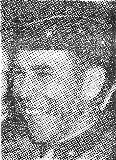
|
Maj. Gen. Clayton L. Bissell, who made the presentation, remarked: "There's nothing I could add, except we're going to miss him."
Barr received the Silver Star for developing the 1,000-pound bomb technique with P-40's; the D.F.C for "extraordinary achievement" while participating in more than 50 combat missions, and the Air Medal for "meritorious achievement" while participating in more than 25 missions.
The Silver Star citation stated: "Col. Barr made initial tests from an airdrome in upper Assam into enemy territory, each time with a 1,000-pound bomb on a P-40 and during this period carried out with other members of command development and technique of this type bombing mission and its actual successful application under fire against the enemy. These tests involved carrying twice the bombload ever carried before by this type of aircraft."
Barr was executive officer of the colorful "Our Assam Draggin'" fighter group. Strangely, he had been in India in P-40's since May, 1942, but never once did the Jap show himself in the air.
When he returns to the States, Barr will hasten to San Antonio, where his wife and three sons, whom he has not seen in a year, are anxiously awaiting his arrival.
Clare Luce’s Column In Roundup Stirring Interest In States
WASHINGTON - A recent Drew Pearson Washington Merry-go-round column stated, "Lovely Congresswoman Clare Luce has been deluged with offers to write magazine articles and newspaper columns ever since she came to Congress. She turned them all down. However, when she did consent to write, she did so without remuneration with a weekly column for United States troops in India who publish the C.B.I. Roundup, and was panned by Washington socialites.
"Fact is, Clare is writing a zippy column in an equally zippy newspaper which attracts attention even when it gets back here one week late."
The Merry-go-round also said that Senator Arthur Vandenberg is telling friends that Clare and he have a pact that he will nominate Gen. MacArthur for president and she will second it.
The column then quotes Luce's Roundup piece, saying that the general's friends and fans, who know the general himself disapproves, were occasioned much distress at possible nomination.
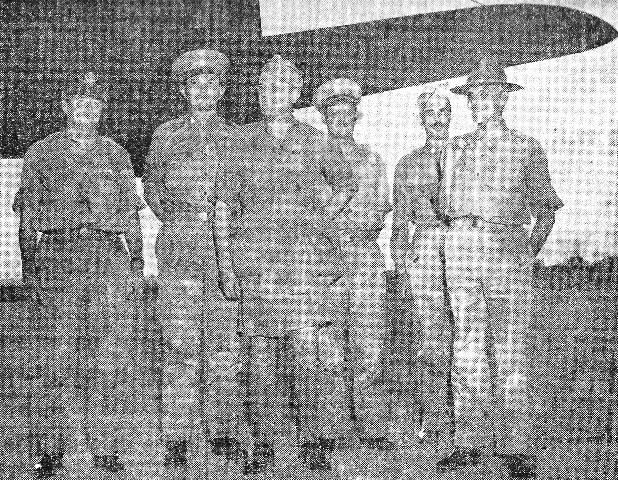 After visiting Washington and London, Lt. Gen. Joseph W. Stilwell returned "home" the other day. The Theater commander, still wearing his
familiar campaign hat, paused briefly at the airport for this picture with five officers who accompanied him back: Front row - Brig. Gen.
William D. Old, 10th Air Force Chief of Staff, and Col. Frank Merrill, assistant Theater G-3; rear row - Lt. Col. Dean Rusk and Maj. Dudley
D. Warner, who will assume duties as assistant G-3's, and Lt. Col. Robert H. Bayne, War Department observer.
After visiting Washington and London, Lt. Gen. Joseph W. Stilwell returned "home" the other day. The Theater commander, still wearing his
familiar campaign hat, paused briefly at the airport for this picture with five officers who accompanied him back: Front row - Brig. Gen.
William D. Old, 10th Air Force Chief of Staff, and Col. Frank Merrill, assistant Theater G-3; rear row - Lt. Col. Dean Rusk and Maj. Dudley
D. Warner, who will assume duties as assistant G-3's, and Lt. Col. Robert H. Bayne, War Department observer.
|
Messages of Congratulations
During his visit to Washington and London, Lt. Gen. Joseph W. Stilwell continued to keep his sensitive fingers on the pulse of the C.B.I. Theater and, upon his return, sent the following messages to the leaders of his two air forces - Maj. Gen. Clayton L. Bissell and Maj. Gen. Claire L. Chennault:-
"The Theater commander commends the commanding general and all officers and enlisted personnel of the 10th Air Force for their consistently fine performance of combat duties both in the air and aground. Operations against the enemy were well planned, were well executed... were sustained and inflicted untold damage on enemy personnel and installations. The personnel of the 10th Air Force have demonstrated that man for man they are definitely superior in fighting spirit, in the ability for prolonged and sustained action, and in the teamwork so essential in battle. We are all proud of the record set by the 10th Air Force and are confident that it will yet deliver more telling blows on the enemy in the operations to come."
"Desire you convey to all officers and men of the 14th my hearty congratulations upon the able support rendered Chinese forces on the Ichang-Tungting Lake front. Destruction of supply dumps, rail, highway and river traffic and Japanese forces, both ground and air, contributed to the smashing victory, brought new laurels to the fighting prowess of the 14th Air Force and foretells the coming of greater victories which are certain to follow."
|
INDIAN AIR BASE - A description and picture of a smaller but just as evil-smelling a bird as the famous Indian vulture may be added soon on the enemy plane identification chart now hanging in operation rooms at USAAF air bases in Gandhi country unless
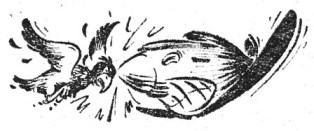 something is done to discourage them from racing combat planes when they take off.
something is done to discourage them from racing combat planes when they take off.
Like houseflies over a cake, these kites circle several hundred feet above a runway and just when a pilot is congratulating himself on getting into the air on a mission along comes a "flying garbage collector" and makes his plane look like it has been hit by enemy AA.
Ground crews have it in for these buzzards on two counts. Besides giving the men extra work patching up holes in planes, they lose eatable food to the feathered sneak and snitch raiders. Plane mechanics are finding out what the British learned many years ago - that
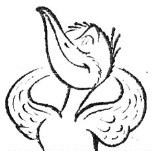 you can't have cake with your tea and eat it too when you are snacking out in the open air.
you can't have cake with your tea and eat it too when you are snacking out in the open air.
These birds circle once or twice, then without warning swoop down from behind and grab bread or cakes off a plate in front of you, often knocking a cup or glass into your lap during the operation.
One mechanic has complained that even the little birds make it tough on the ground crews trying to leap planes in the air in India. He moaned: "The other day a medium bomber was just passing through and the two hours it was on the parking strip birds built a nest in the carburetor. Naturally the motor wouldn't start.
Hodgie Giving The Brigadier ‘Double Talk’
By S/Sgt. KARL PETERSON
IATF HEADQUARTERS - Pvt. Warren J. Hodgdon, our most fervent athletic enthusiast, is currently resting gracefully behind the No. 8 ball. It seems he casually inquired, while out shooting a round of golf on the local course, where he might play some tennis, and was directed to a nearby club.
Outfitted in very proper tennis costume and winsome manner, he turned up later at the club, blithely signed a book along with sundry majors, captains, etc. On the courts he played a set or two with a pleasant British major, who subsequently introduced him to "the" general as "Lieutenant" Hodgdon. Our hero gulped, stammered, and quickly started up a match.
Now the brigadier keeps phoning cordial invitations to drop around to the club for a game, adding absent-mindedly, "What did you say your name and rank was?," and Hodgie is giving out with more diplomatic "double talk" than the Turkish Prime Minister to keep his secret.
HOT CONTROVERSY
Hot rages the controversy over the fancy loud speaker which has been set up facing the "patio" between our three new barracks by those rowdy radiomen, S/Sgts. Harold Fioravanti, John Murphy, Sgt. Clement Poisson and Cpl. Jack Langemak. The strains of sweet music which are piped outdoors from the home-made record player are pleasant in the twilight after chow when one relaxes on the barracks porch. But during the day, sleep, too, hath charms, say the boys who have been on duty the previous night, and with the mighty strains of the "Blue Danube Waltz" crashing out full volume well -
Principal bone of contention is the "classics vs. popular" problem. The "Sling-shot Crowd," as our boys are called, are strictly long-hair stuff-fans, but their host of listeners clamor for sweet and swing, with Harry James' recording of I Had the Craziest Dream No. 1 on the list.
By dint of sufficient groaning, the masses are getting their favorites, but with plenty of the stentorian efforts of Benjamin Gigli thrown in.
STORY OF THE WEEK
Best story of the week is Pvt. Grady Ammons telling how he nearly joined the Navy. A friend recommended a neat, newly-commissioned vessel for which a crew was being sought: "She's named the Mauna Loa after a volcano in Hawaii," he explained.
"Funny," said our Gawgia peach, "How come they name a ship after a volcano?"
"She's a munitions carrier," was the answer. Grady waited for the President's greeting instead.
|
To most members of the Theater, the arrival of a letter is an occasion greeted with the warmth akin to catching the right card to an inside straight.
Even the chaplain and the post exchange officer, violently jealous of their laurels, are the first to admit that their best efforts fall short of equaling such G.I. morale-builders as a sugar report from the girl friend, a note from mother telling how beautifully, the petunias are blooming in the backyard or an epistle from Uncle Horace relating the requisite details of how he argued the rationing board into that retread tire.
Yes, everybody enjoys letters.
Well, that is, almost everybody. There's one exception who stands out in bold relief - the editor of the Roundup.
In the days of their greatest triumphs, Spencer Tracy, Frederick March, Walter Pidgeon and even precocious Mickey Rooney never registered such a wide span of emotions on their facile faces as those expressed by ye ed of this C.B.I. fishwrapper as he opens his mail.
Gents, it would tear your heart strings out by the roots to watch this daily performance. If Pvt. Murphy up in Assam isn't happy about the beer ration, his first thought is to dash off 1,000 well chosen words of blazing vituperation blaming the Roundup for the fact. If S/Sgt. Stinklebaum at a port base feels that his outfit isn't receiving the publicity it deserves - although all we've had from his sector is silence rivalling that of the grave - he insults everyone on the sheet from editor to the Indian who comes in mornings to sweep the editorial office. If Cpl. Ratzaufft up China-way feels as if we are overlooking the greatest war poem since Flanders Field in his contribution (which he must have composed during a nightmare engendered by nine successive nights of Indian whisky), he forwards such a tearful note that we have to dry out the letter over a hot stove before it's possible to read it.
Other letters are a snare and a delusion. There is, for instance, the type which start out this way: "We believe that your paper is the greatest single morale factor in the Theater. The gang at (censored) live from week to week only because they know that the Roundup is coming." Just when ye ed's chest is puffed out so far that his shirt buttons are about to pop off, the text of the note suddenly deflates him by veering to something like this: "I hereby offer my service as a reporter, I wrote for my grammar school paper nine years ago, and Miss Zilch, my seventh grade teacher, told me I had great talent. Besides, I don't get along with my top sergeant."
Ye Ed is about to report to the hospital any day now for an eye test. Some of the letters are practically undecipherable. Written in either ink or pencil, the scribbling looks like a cross betwixt a lame hen reeling across the page and Egyptian hieroglyphics. It is beginning to be suspected that this is a purposeful, Michaevillian attempt to blind ye ed and send him back to the States to be introduced to a Seeing Eye dog.
Most ironic is the attitude of the rest of Rear Echelon HQ personnel as the mail orderly tosses the daily pile of letters upon the editor's desk. More than once we've heard sotto voce, the jealous mummer:
"Look at all the letters that lucky so-and-so gets."
Gents, it just ain't fair.
The C.B.I. Roundup is a weekly newspaper published by and for the men of the United States Army Forces in China, Burma, and India, from news and pictures supplied by staff members, soldier correspondents, the United Press, and Office of War Information. The Roundup is published Thursday of each week and is printed by The Statesman in New Delhi, India. Editorial matter should be sent directly to Lt. Floyd Walter, Rear Echelon Hq., U.S.A.F., C.B.I., New Delhi, and should arrive not later than Monday in order to make that week's issue. Pictures must arrive by Sunday and must be negatives or enlargements. Stories should contain full name and organization of sender.

JUNE 17, 1943
Adapted from the original issue of C.B.I. Roundup
Copyright © 2019 Carl Warren Weidenburner
TOP OF PAGE PRINT THIS PAGE ABOUT THIS PAGE SEND COMMENTS
PREVIOUS ISSUE CLOSE THIS WINDOW NEXT ISSUE
 And kid sister should be ecstatic when she opens her package and finds those cute shoes which she hasn't enough coupons to purchase?
And kid sister should be ecstatic when she opens her package and finds those cute shoes which she hasn't enough coupons to purchase?
